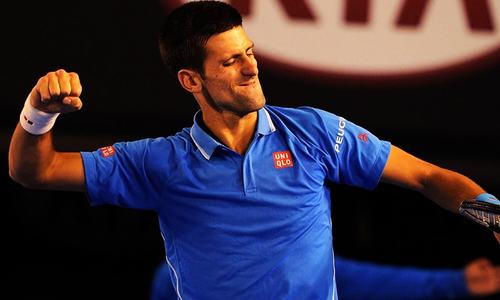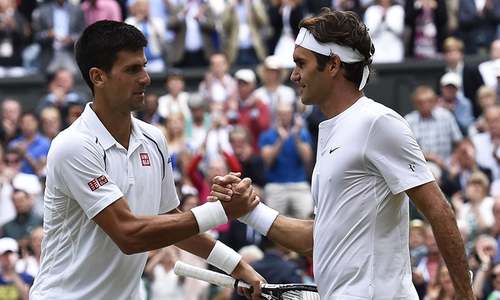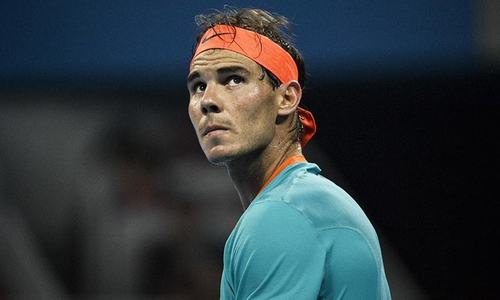MELBOURNE: A bombshell report alleging widespread match-fixing in tennis rocked the Australian Open as the season's first Grand Slam tournament began under a cloud on Monday.
The BBC and BuzzFeed claimed 16 top-50 players in the past decade, including Grand Slam champions, had been repeatedly suspected of fixing matches for betting syndicates.
Three suspect matches were at Wimbledon, and eight of the players under suspicion were due to take to the courts for the Australian Open in Melbourne, the report claimed.
None of the “core group” of 16 players had faced sanctions, added the report, which was based on secret files leaked by a group of anonymous whistle-blowers.
Association of Tennis Professionals (ATP) chief Chris Kermode said the timing of the report was “disappointing” and rejected any suggestion that match-fixing had been covered up.
“The Tennis Integrity Unit and the tennis authorities absolutely reject any suggestion that evidence of match-fixing has been suppressed for any reason or isn't being thoroughly investigated,” Kermode told reporters.
“And while the BBC and BuzzFeed reports mainly refer to events from about 10 years ago, we will investigate any new information, and we always do.”
$50,000 bribes
The match-fixing report cast a shadow over the Australian Open, where 128 matches were scheduled on day one with defending champions Novak Djokovic and Serena Williams both in action.
BuzzFeed said players were targeted in hotel rooms at major tournaments and offered $50,000 or more to fix matches for the betting syndicates.
The leaked files included details of an investigation into a 2007 match which world number four Nikolay Davydenko lost to 87th-ranked Martin Vassallo Arguello. It found insufficient evidence of corrupt practice by either player.
But the report said the probe uncovered syndicates in Russia and Italy making hundreds of thousands of dollars betting on matches investigators thought to be fixed.
The key group of 16 suspect players had not been targeted in any crackdown, it said, questioning the effectiveness of the Tennis Integrity Unit (TIU), the sport's anti-corruption body.
Kermode said the TIU had won 18 convictions including six life bans since it was set up in 2008, adding it “has to find evidence as opposed to information, suspicion, or hearsay”.
“Let me just say that all of us here in tennis are absolutely committed to stamp out any form of corrupt conduct in our sport,” he said.
“There is a zero-tolerance policy on this. We are not complacent. We are very vigilant on this.”
Other allegations included that a confidential report in 2008 recommended investigations into 28 players “but the findings were never followed up”, according to the BBC.
The sport introduced a new anti-corruption code in 2009 but after taking legal advice were told previous corruption offences could not be pursued retrospectively.
Mark Phillips, one of the investigators in the 2007 probe, told the BBC: “There was a core of about 10 players that we believed were the most common perpetrators that were at the root of the problem.”
“The evidence was really strong, there appeared to be a really good chance to nip it in the bud and get a strong deterrent out there to root out the main bad apples.”
The report added that the European Sports Security Association, which monitors betting for bookmakers, flagged up more than 50 suspicious matches to the TIU last year.
The main corruption allegations rocking the game
“Secret files” leaked to website Buzzfeed News and the BBC have alleged widespread match-fixing and corruption in tennis. Below is a summary of the main allegations:
Tennis governing bodies were aware of a core group of 16 players in world's top 50 involved in match-fixing. None have been sanctioned
Eight of the 16 are playing in the Australian Open, the season's first Grand Slam, which began on Monday
One top-50 player currently in the Australian Open is suspected of repeatedly fixing his first set in matches
Match-fixing is orchestrated by gambling syndicates in Russia and Italy who contact players in hotel rooms and offer $50,000 or more
The names of more than 70 players have appeared on nine leaked lists of suspected fixers, which were given to tennis governing bodies in the past 10 years
After a 2008 probe, which implicated 28 tour players, all were allowed to continue playing without sanction
Tennis Integrity Unit, which was set up to ensure fair play, admitted shelving the evidence of the 2008 report because a new integrity code they introduced afterwards “could not be enforced retrospectively”
The 2008 investigation was triggered by a notorious match between the world number four, Russia's Nikolay Davydenko, and Argentina's 87th-ranked Martin Vassallo Arguello, which attracted millions of dollars in highly suspicious betting on long-odds underdog Arguello to win from accounts originating in Moscow
Davydenko was a set and a break up and cruising to victory when he pulled out injured. An investigation “was unable to find evidence” that either player had been involved in any corrupt practice














































